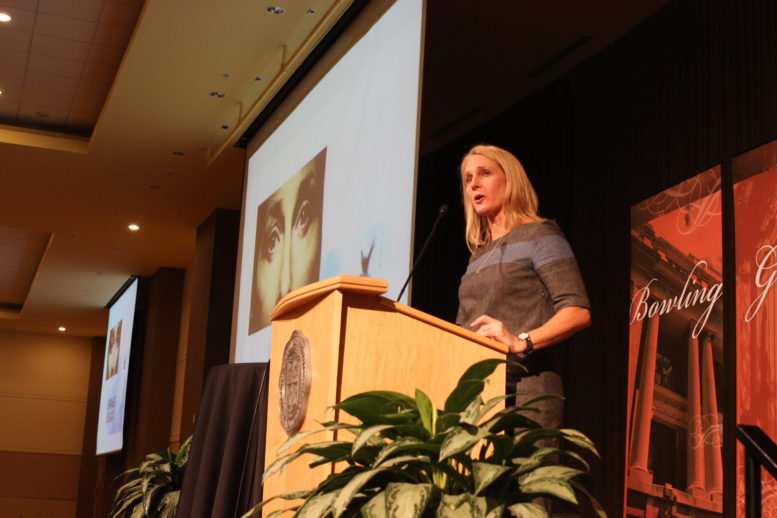By DAVID DUPONT
BG Independent News
Piper Kerman was a just a couple years out of college when she stepped over the line.
She’d been traveling all over the world with her drug dealing girlfriend. She tried to keep out of her lover’s business until she was asked to carry a suitcase full of money from Chicago to Brussels.
Kerman knew what she’d done, and soon after broke off the relationship, returned to the United States and put that life behind her. That’s what she thought. About five years later federal authorities rang her doorbell in New York City, and the time came to pay for her crime.
Kerman ended up serving 15 months in federal prison, and came out to write the best seller “Orange is the New Black: My Year in a Women’s Prison.” On Tuesday night she spoke at Bowling Green State University as the guest of University Libraries’ Ordinary People: Extraordinary Lives series.
Being in prison meant more than serving time.
Kerman said when she had carried that money from Chicago to Brussels she didn’t think about the consequences her actions. In prison she came face to face with those whose lives had been devastated by drugs.
“My closeness and connection to those women led me to realize the harm of my own actions, and I’m very, very grateful for that,” she said.
Kerman said she was grateful to Jenji Kohan who produced the Netflix series based on the book, for keeping the issues she wanted to highlight in the book in the forefront.
Among those were friendship. Kerman said she didn’t go into prison expecting to find friends, but wouldn’t have survived without them.
Kerman talked about Pom-Pom. They worked at jobs near each other in prison. Pom-Pom was released a few months before Kerman, just before Thanksgiving. She ended up sleeping on the floor of a relative who didn’t want her there. The area she lived in was cold and dangerous and poor.
Before Christmas she wrote a letter to Kerman, telling her to keep her spirits up because she’d be released soon.
Then she wrote: “I really miss you guys. I feel like you’re my real family.”
Kerman was overwhelmed. She cried not just about her friend’s current situation but because “I wished she was back in prison with us.”
In writing “Orange Is the New Black,” she said she wanted readers to feel as deeply about Pom-Pom as she did.
Since being released in early 2005, Kerman has worked on efforts to assist inmates and on criminal justice reform.
The United States imprisons more people than any other country in the world. While the U.S. has 5 percent of the world population it has 25 percent of its prisoners. It has a third of the female prisoners.
In the past three decades the number of female inmates has increased 650 percent. (The male prison population increased 400 percent.) And those arrested, judged and sentenced are disproportionately black. This was not because of any crime wave, but the way sentences are handed out. Most were for non-violent offenses such as drug possession and prostitution. In the past these offenses wouldn’t merit prison time.
In New York City it costs $65,000 a year to put a woman in prison. If she has kids and they go into foster care, that expense doubles. A father going to prison is devastating to a family; the effect of a mother going to prison is “seismic,” she said.
If that woman is “held accountable within the community,” and gets the services she needs, whether drug treatment or job training, it costs $18,000.
What needs to be done is “right sizing sentences,” she said.
There also needs to be jail and court reform. While there’s 2.3 million people are in prison there are as many as 12 million in local and county jails.
The public defense system needs to be strengthened. Kerman said 80 percent of defendants are too poor to hire an attorney.
She also called on reform of the juvenile justice system. The number of inmates in juvenile jails has been cut in half.
More needs to be done to keep more young offenders in the community. Someone sent to juvenile jail is much more likely to commit another crime, she said.
And in no case should a juvenile serve time in an adult prison.
Kerman concluded that it had been a great day – on campus surrounded by orange, she quipped. She was out spreading the word about a cause she was passionate about. It was not a day when she was entering prison or carrying drug money from Chicago to Brussels.
“What I want for all the women I did time with is to be recognized, not for our worst days, but our best days.”



